Guest blog by Lucia Glover
Founder of Lucia Glover Nutrition
Thrive4life invited Lucia Glover, founder of Lucia Glover Nutrition, to speak on how women can optimise their diet and nutrition in order to balance their hormones naturally for better period, fertility, and menopause health. Here’s what she had to say.
“WE WANT TO KNOW THAT THE WOMAN STARING BACK AT US IN THE MIRROR IS THE BEST VERSION OF OURSELVES”

Lucia Glover, Transformative Nutritionist & Rejuvenation Specialist.
The truth is, whether we are suffering from PMS symptoms, post-natal depression, experiencing peri- or post-menopause hot flushes, or other hormone-related conditions, we can’t help but feel disconnected with ourselves at times.
You’re not alone if you wonder why your mood seems to flip at the drop of a hat, why you suddenly feel anxious or you start to burn up and have heart palpitations. There’s scientific reasoning for why you might be experiencing these things. Know that your hormones can have a big impact on your physical status, emotional status and subsequently your behaviour.
What exactly are hormones?
Hormones are chemicals that carry messages through your blood to your cells. They signal to your body what to do, and when to do it. Hormones are powerful. Too much or too little of certain hormones, due to genetics, diet, environment, toxin exposure and lifestyle, can medal with our body’s natural hormone production.
During our life stages it’s the fluctuations in oestrogen and progesterone that are responsible for many of our hormone-related symptoms. Since we are all so different and have our own unique biochemistry, it’s not surprising that some of us experience more severe symptoms than others.
How can diet impact our hormones?
Inflammatory foods such as fried foods, processed meats, sweeteners, sweetened beverages, increase inflammation in the body. Our hormones are highly sensitive to inflammation so if we eat a lot of these foods it can lead to hormone imbalances. Inflammatory hormonal conditions that affect a significant number of women include premenstrual syndrome, fibroids, endometriosis and polycystic ovary syndrome (PCOS).
Eating for healthy periods
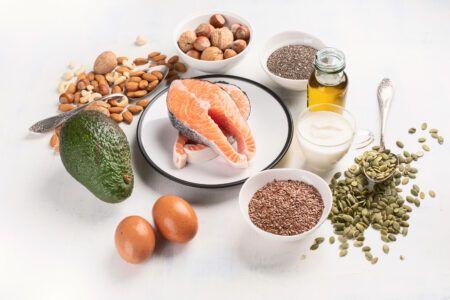
Eating foods that are high in omega-3 can dampen down inflammation.
If we look at PMS related menstrual cramps, these result from inflammation. This inflammation can cause the release of hormone like substances called prostaglandins which constrict blood vessels in the walls of the uterus, causing cramping. Women with high levels of prostaglandins tend to have more severe menstrual cramping. So, it makes sense for us to try our very best to lower the inflammation in our body. We can so by eating omega-3s from fatty fish and nuts and seeds as these foods dampen down inflammation.
Those on a vegan diet will be happy to learn that studies show that this diet promotes significant reductions in bodily inflammation. However, as we get most of our B12 from animal products, if you don’t eat animal products, you need to be taking a B12 supplement. It’s best to work with a nutritionist or GP to test your levels to know what they are so that you know how much to supplement with.
It’s common to experience a dip in your iron levels during your period, particularly if your menstrual flow is heavy. This can lead to fatigue, bodily pain, and dizziness. This is because our blood contains iron, so if we have heavy periods we lose a lot of iron. We can even go on to develop iron deficiency anaemia. The richest food sources of iron include liver (but this is to be avoided during pregnancy), red meat, means such as red kidney beans, edamame beans and chickpeas, nuts, dried apricots, soybeans and quinoa. Leafy green vegetables such as kale and spinach also boost your iron levels.
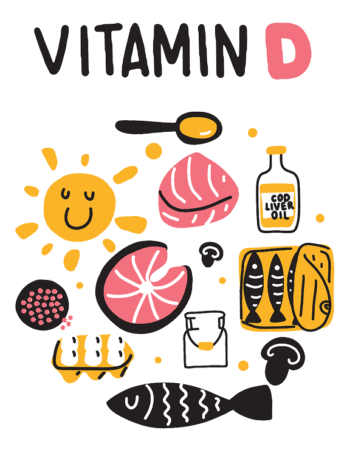
Sources of vitamin D
Vitamin D also plays a unique role in menstruation. Multiple studies have emerged over the last decade demonstrating a relationship between vitamin D and menstrual disorders, particularly the frequency of your cycle and pain. The NHS recommends that everyone supplement with vitamin D during the winter months as we cannot get enough from the sun.
Make phytoestrogen foods a staple in your diet by including soy products such as whole soybeans, tofu, miso, tempeh, beans and flaxseeds. Oestrogen dominance is a common hormone related condition when women have high levels of oestrogen. This is linked to breast pain. By including phytoestrogen-foods in your diet you can decrease oestrogen levels and reduce breast pain and lumpiness.
You’ll be happy to learn that dark chocolate is an excellent source of magnesium which helps reduce menstrual cramps and contains high levels of antioxidants and iron. 75% dark chocolate are where the real benefits are!
Many women get thrush during menstruation. Yoghurt is a fantastic probiotic, and it strengthens the good bacteria in your vagina and helps you fight yeast infections during periods.
Eating for healthy fertility
Deciding to have a baby is one of life’s biggest decisions, but if things don’t go as planned, it can be very stressful for both partners. If we look at research into the positive effects of diet on fertility, women trying to conceive naturally (without in vitro fertilization), who consume the following nutrients through diet, this is linked to having positive effects on conceiving and having a healthy pregnancy.

Research suggests that a diet high in unsaturated fat, whole grains, vegetables, and fish is associated with improved fertility
B vitamins help to ensure the quality of the egg and sperm, as well a healthy pregnancy. If we are deficient in B12, this can lead to temporary infertility. But this can improve with vitamin B12 treatment.
Robust evidence exists showing that healthy fats from omega-3 fatty acids can improve male and female fertility by regulating our hormones for ovulation and increasing blood flow to the uterus to support the opening of the follicle to release the egg. After conception, omega-3s are important building blocks for the development of the baby’s brain and eyes. It also helps prevent pre-eclampsia, a condition where blood pressure in the mother is elevated. Further, omega-3s help with postnatal depression by bolstering the vesicles that carry our mood chemicals in and around the brain. It’s important to note however, that the NHS recommend that women trying to conceive eat no more than two portions of oily fish a week due to heavy metals that our fish are exposed to in our seas.
Folic acid, also known as B9 and folate, greatly reduces the risk of babies developing serious brain and spinal cord problems like spina bifida. Foods high in folic acid include banana’s, avocado, tomatoes, eggs, dark leafy greens, legume.
A diet high in inflammatory foods including fatty red and processed meats, fried potatoes, sweets, and sweetened beverages is found to have negative effects on fertility. The Mediterranean diet on the other hand, has long been applauded for its multiple health benefits, being consistently ranked among the healthiest diets in the world. It effectively reduces inflammation, and new research shows that it may help overcome infertility. It includes plenty of whole grains, extra virgin olive oil, fruits, vegetables, beans and legumes, nuts, herbs, and spices. Yoghurt, cheese, and lean protein sources such as fish, chicken, eggs and red meat are eaten in small amounts.
Eating for healthy menopause
The next big life stage of a women is entering into the menopause. When we reach peri menopause around age 45 (for some, perimenopause starts in the 30s) you may still menstruate but your cycles may be closer together or further apart, the flow may be heavier or lighter and the colour may be darker and the consistency more clotty. Ultimately, your body is readjusting to the lower and wonky levels of hormones. We see progesterone levels start to drop first. This is because progesterone is mainly produced when we ovulate which is no longer happening in this instance. It’s this fluctuation in hormones that brings on menopause symptoms. Some of these include night sweats, hot flushes, tingling extremities, increase in body temperature, weight gain, joint pain, vaginal dryness, changes in taste, itchiness, skin changes, sleep problems and memory lapses.
Once you stop having a period for 12 consecutive months, you are then in the post-menopause stage. During this stage menopausal symptoms get milder or go away. Most women continue to have hot flashes anywhere from 4-10 years after menopause, but most of these will decrease in frequency and severity.
The good news is, shifting your diet can help with symptoms. Phytoestrogen foods like soy from whole soybeans, tofu, soy milk, soy yoghurt, miso, flaxseeds, beans and pulses all contain a chemical that’s similar to oestrogen that may mimic oestrogen in the body, and since our levels of oestrogen are low in the menopause, these foods may alleviate some of the symptoms like hot flushes. There’s a recent study called the WAVE study that found that women who consumed a ½ cup of whole soybeans a day and were on a low fat vegan diet for three months significantly reduced their symptoms.
Several studies link healthy fats in fish to improved mood and brain function. Omega-3 fatty acids can also help keep blood pressure levels in check and healthy blood pressure can help control hot flashes. Fatty fish like salmon is also one of the few food sources of vitamin D, a key nutrient for both mood and bone health. Vitamin D is absolutely necessary to help absorb calcium intake and improve our bone structure.
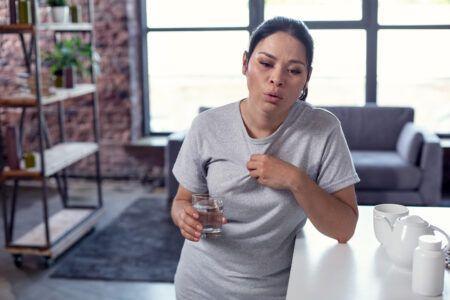
Changes to your diet can help reduce menopause symptoms.
While you’re dealing with hot flashes and night sweats, your bones are going through changes of their own throughout the menopause. Bone loss becomes prevalent and may lead to conditions like osteoporosis. Foods with high sources of calcium include dairy products and bony fish like anchovies and sardines.
It’s also important that you support your body to hang on to muscle by eating plenty of high-protein foods, such as fish, poultry, legumes, nuts and seeds.
Eating plenty of fruits and vegetables will increase your anti-oxidant intake and help prevent cell damage. Include dark green leafy vegetables like spinach, kale and broccoli, as well as bell peppers, eggplant, tomatoes and carrots. Brightly coloured fruits, such as mango, cherries and berries, are also loaded with powerful antioxidants.
It might seem obvious, but it’s so easy to forget to drink enough water during the day. Aim for a total 1.5 litres through the day. Staying hydrated during menopause will to help keep you manage your weight as well as flush out toxins.
Foods that exacerbate menopause symptoms include spicy foods alcohol, inflammatory foods and blood sugar spiking foods such as white carbohydrates and should be avoided.
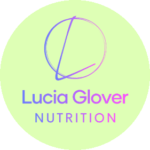 Are you are struggling with your own hormones? Perhaps you’re going through the menopause, or have weight that’s hard to shift, or suffer from PMS symptoms or other hormone and health related issues?
Are you are struggling with your own hormones? Perhaps you’re going through the menopause, or have weight that’s hard to shift, or suffer from PMS symptoms or other hormone and health related issues?
Get in touch with Lucia Glover for a free 20-minute hormone review call. She will lay out your primary health concerns, and meet them with some immediate energy boosting strategies you can start applying straight away.
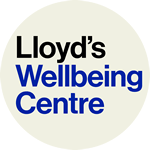 If you work or live near the City of London, then our sister company the Lloyd’s Wellbeing Centre operates a Menopause & Hormone Health Clinic from the Lloyd’s building near Leadenhall Market, EC3.
If you work or live near the City of London, then our sister company the Lloyd’s Wellbeing Centre operates a Menopause & Hormone Health Clinic from the Lloyd’s building near Leadenhall Market, EC3.










